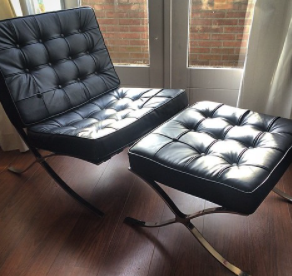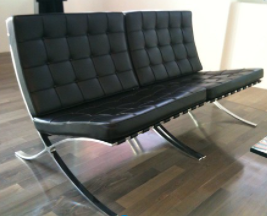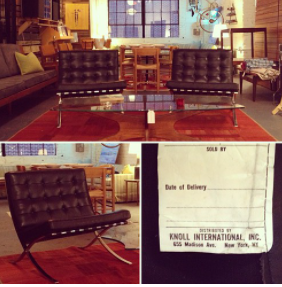The modernist classic design originally intended exclusively for the German Pavilion at the Ibero-American Exposition hosted in Barcelona, in 1929.

Image source:https://search.creativecommons.org/photos/c7fee43d-fd87-405d-ac15-af9fbb4029cc by GuySie
The design resulted from the collaboration between the famous Bauhaus architect Ludwig Mies van der Rohe and his longtime partner, architect and designer Lilly Reich.
Less is More
As an icon of the modern movement, the Barcelona Chair exudes a simple elegance that epitomizes Mies van der Rohe’s most famous aphorism, “Less is More.”
The chair exemplifies Mies van der Rohe’s highly disciplined architecture. Further, two chrome-plated, flat steel bars support the structure on either side. Seen from the side, the single curve of the bar form the chair’s back and front legs cross the S-curve of the bar to form the seat and back legs. In addition, the simple shape derives from a long history of precedents, from ancient Egyptian folding stools to nineteenth-century neoclassical seating. Also, the cantilevered seat and the back of the original chairs were upholstered in white kid leather with welt and button details.

Image source: https://commons.wikimedia.org/wiki/File:Pavell%C3%B3_Mies_06.JPG

Image source: https://search.creativecommons.org/photos/3760aba0-3094-4faf-8ee6-6659ea59d73b by Gribiche
A Royal Chair
Although many architects and furniture designers of the Bauhaus era intended to provide well-designed homes and impeccably manufactured furnishings for the “common man,” the Barcelona chair was an exception. Designed for the Spanish Royalty to oversee the opening ceremonies of the exhibition, Time magazine described it as inhabiting “his sumptuous German pavilion.” Further, the form is thought to be extrapolated from Roman folding chairs known as the Curule chair, which were upholstered stools used by Roman aristocracy. According to Knoll Inc., despite its industrial appearance, the Barcelona chair requires hand craftsmanship.

Image source: https://search.creativecommons.org/photos/3604b088-4dd8-4e19-b78f-03598eece308 by andreas_fischler
Production
In 1948, a year after the death of Reich, Mies van der Rohe granted the New York company Knoll the rights to produce their furniture. The chair’s reintroduction, with welded stainless steel replacing the bolted frame, became popular in the 1950s and 1960s. However, Knoll only officially patented the chair in 2004, hence the amount of replicas on the market. Additionally, Mies van der Rohe and Reich’s originals sell on Knoll’s website from $5,429.

Image source: https://search.creativecommons.org/photos/d1623d0f-dbfb-4cc6-8fb6-436620db0262 by Paris on Ponce & Le Maison Rouge
Data Sheet
Designer: Ludwig Mies van der Rohe and Lilly Reich
Year: 1929
Producer: Knoll
Finishes: Available in a range of Spinneybeck leathers. The frame is available polished chrome and foam that meets requirements for BS5852.
Additional Information
- The structure has 40 individual panels, which are cut, hand-welted, and hand-tufted with leather buttons produced from a single cowhide. Cushions are premium quality, highly resilient urethane foam with down-like dacron polyester fiberfill.
- Upholstery straps are cowhide belting leather, and the sides are dyed to match a specified upholstery color. Additionally, the 17 straps are used for cushion support.
- The Frame is polished chrome hand-ground and hand-buffed to a mirror finish. Then the upholstered straps attach to aluminum rivets.
- The KnollStudio logo and signature of Ludwig Mies van der Rohe are on the leg.
Info source:
https://www.knoll.com/product/barcelona-chair
https://flyingarchitecture.com/models/barcelona-chair
https://flyingarchitecture.com/models/barcelona-chair
https://www.moma.org/collection/works/4369
https://en.wikipedia.org/wiki/Barcelona_chair
https://www.ft.com/content/c8606bfe-0b75-11e5-8937-00144feabdc0
